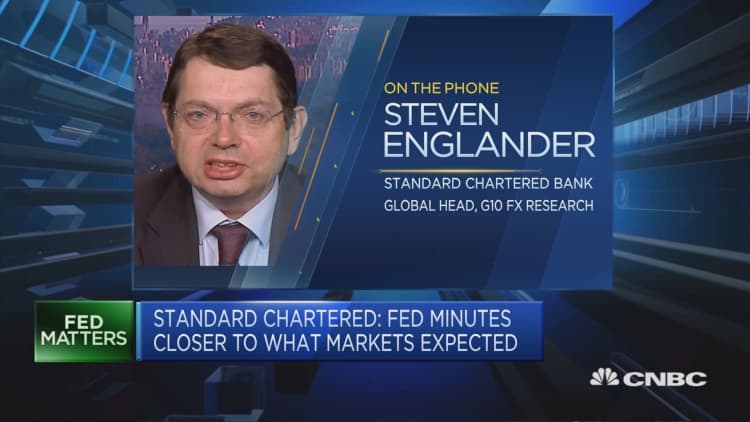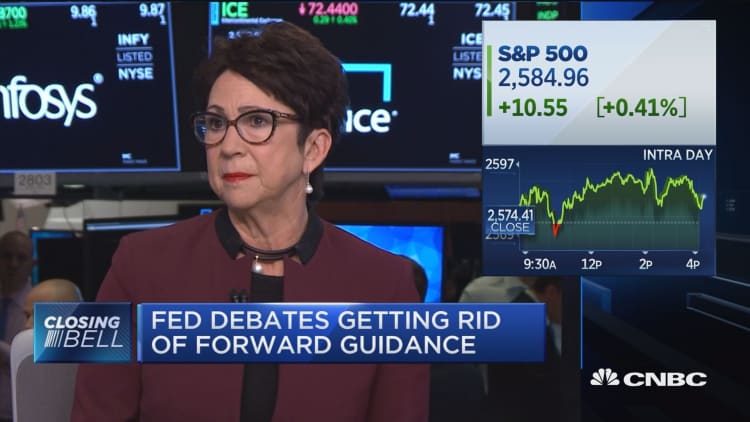Investors looking for an easier Federal Reserve should be careful what they wish for, as such cycles can portend bad news down the road.
Markets have cheered in recent days as Fed officials indicated a newfound reluctance to raise interest rates. That's come after four hikes in 2018 and indications as recently as September that this year likely would see three more quarter-point increases.
Worries that the Fed would make a policy mistake and tighten too much were heightened in early October following statements from Chairman Jerome Powell.

In recent days, though, Powell and his colleagues have sought to assuage Wall Street with talk that policymakers will be patient with policy moves and are attuned to the messages coming from markets.
That kind of talk, though, often comes before economic downturns.
"If we are indeed nearing the point where the Fed stops tightening ... should this offer investors confidence that an equity bear market can be avoided? No! Traditionally the yield curve steepens as the Fed eases immediately prior to a recession," said Albert Edwards, a market strategist at Societe Generale known for his generally bearish outlook.
Indeed, the gap between various government bond yields has widened slightly since the beginning of the year, though the 2- and 5-year yields are still inverted, meaning the former is higher than the latter. Inverted yield curves have been strong predictors of recessions ahead.
Worries about policy 'time lag'
The Fed doesn't except growth to turn negative this year.
But statements in the minutes from the December meeting of the Federal Open Market Committee indicate that officials are growing more concerned about a slowdown, and are examining whether their own policies are exacerbating the downside risks ahead.
The meeting summary noted that one of the dangers to the longer-run outlook is "greater-than-expected negative effects from the monetary policy tightening to date."
"What people don't seem to get is that monetary policy hits the economy with a time lag," David Rosenberg, chief economist and strategist at Gluskin Sheff, said in his daily market note Thursday. "But the Fed actually does realize this and is becoming more vocal about the prospect that it has already overtightened."
Even though investors are happier with the more dovish tone, Rosenberg warned that it could be a prelude to longer-term problems.
"The Fed will be forced to ease policy before too long, and is moving incrementally in that direction. But as is often the case, they are far too late," he said. "The lags. This is what the consensus economics community seems to be missing, which is why it has never accurately called for a recession, even when it was starting. Read what many were saying in early 2001 and 2008 and you will see what I mean."
"After reading the dovish tone of the minutes, one is left wondering why the Dec. 19 rate hike was even necessary," Rosenberg added.
The Fed and Wall Street
Similarly, Peter Boockvar, chief investment officer at the Bleakley Advisory Group, noted that "the tone of the minutes was quite different than the actual FOMC statement and Powell's press conference." He added that the minutes are "massaged, changed and used as another form of communication and it's clear that the Fed altered the tone of the minutes to fit the market reality since the meeting."
Finally, Boockvar concluded that the market is "again in control of government policy."
That notion that financial markets are dictating monetary policy is a familiar one and has been an uncomfortable narrative for the bull market since it began in March 2009. Fed easing has been accompanied by market rises while even indications that the central bank is taking its foot off the accelerator slightly have been met with sell-offs.
SocGen's Edwards called recent Powell comments "abject capitulation" by a Fed beholden to Wall Street.
But Edward Lazear, former chairman of the Council of Economic Advisers, said the central bank would be wise to listen to the markets and adjust policy accordingly.
In an op-ed appearing in Thursday's Wall Street Journal, Lazear noted that the Alan Greenspan-led Fed cut rates the day after the Black Monday crash in 1987, a move he called "a swift and strong response" that "stands in contrast with today's more cautious Fed."
A "data-dependent Fed," Lazear wrote, "should remain humble about the accuracy of its forecasts, and pay close attention to the market in particular."



